Comprehensive research on a unique painting genre from fourteenth-century China
In Painting Architecture, Leqi Yu conducts comprehensive research on jiehua, or ruled-line painting, a unique painting genre in fourteenth-century China. This genre relies on tools like rulers to represent architectural details and structures accurately. Such technical consideration and mechanical perfection linked this painting category with the builder’s art, which led to the belittling of Chinese elites and eventually won the admiration of Mongol patrons. Yu argues that painters in the Yuan dynasty made new efforts towards a unique modular system and an unsurpassable plain-drawing tradition. She argues that these two strategies made architectural paintings in the Yuan dynasty entirely different from their predecessors, as well as making the art form extremely difficult for subsequent painters to imitate.
In Painting Architecture, Leqi Yu conducts comprehensive research on jiehua, or ruled-line painting, a unique painting genre in fourteenth-century China. This genre relies on tools like rulers to represent architectural details and structures accurately. Such technical consideration and mechanical perfection linked this painting category with the builder’s art, which led to the belittling of Chinese elites and eventually won the admiration of Mongol patrons. Yu argues that painters in the Yuan dynasty made new efforts towards a unique modular system and an unsurpassable plain-drawing tradition. She argues that these two strategies made architectural paintings in the Yuan dynasty entirely different from their predecessors, as well as making the art form extremely difficult for subsequent painters to imitate.
216 pages | 12 color plates, 54 halftones | 6 x 9 | © 2022
Architecture: Middle Eastern, African, and Asian Architecture
Art: Middle Eastern, African, and Asian Art
History: Asian History
Table of Contents
List of Illustrations
Acknowledgments
Introduction
The Concept of Jiehua
Why the Mongol Yuan?
Xia Yong: A Neglected Jiehua Master
1. Painting and Architecture
Dilemma: The Yellow Crane Tower or the Yellow Pavilion?
Modularity in Xia Yong’s Art
Utility and Artistry
2. Painting and Painter
Wang Zhenpeng and His Lineage
Baimiao: The Power of Ink and Line
Landscape in Jiehua: Late-Yuan Literati Style versus Northern Song Li-Guo Style
3. Painting and Politics
Direct Appointments: Based on Emperors’ Interest in Complex Constructions
Elegant Gatherings: The Interactions between Southern Scholars and Northern Officials
Conclusion
The Professional Atelier: An Alternative Interpretation of Xia Yong’s Jiehua
The Art Market: The Cultural Values of Buildings Painted
Notes
Bibliography
Index
Acknowledgments
Introduction
The Concept of Jiehua
Why the Mongol Yuan?
Xia Yong: A Neglected Jiehua Master
1. Painting and Architecture
Dilemma: The Yellow Crane Tower or the Yellow Pavilion?
Modularity in Xia Yong’s Art
Utility and Artistry
2. Painting and Painter
Wang Zhenpeng and His Lineage
Baimiao: The Power of Ink and Line
Landscape in Jiehua: Late-Yuan Literati Style versus Northern Song Li-Guo Style
3. Painting and Politics
Direct Appointments: Based on Emperors’ Interest in Complex Constructions
Elegant Gatherings: The Interactions between Southern Scholars and Northern Officials
Conclusion
The Professional Atelier: An Alternative Interpretation of Xia Yong’s Jiehua
The Art Market: The Cultural Values of Buildings Painted
Notes
Bibliography
Index

